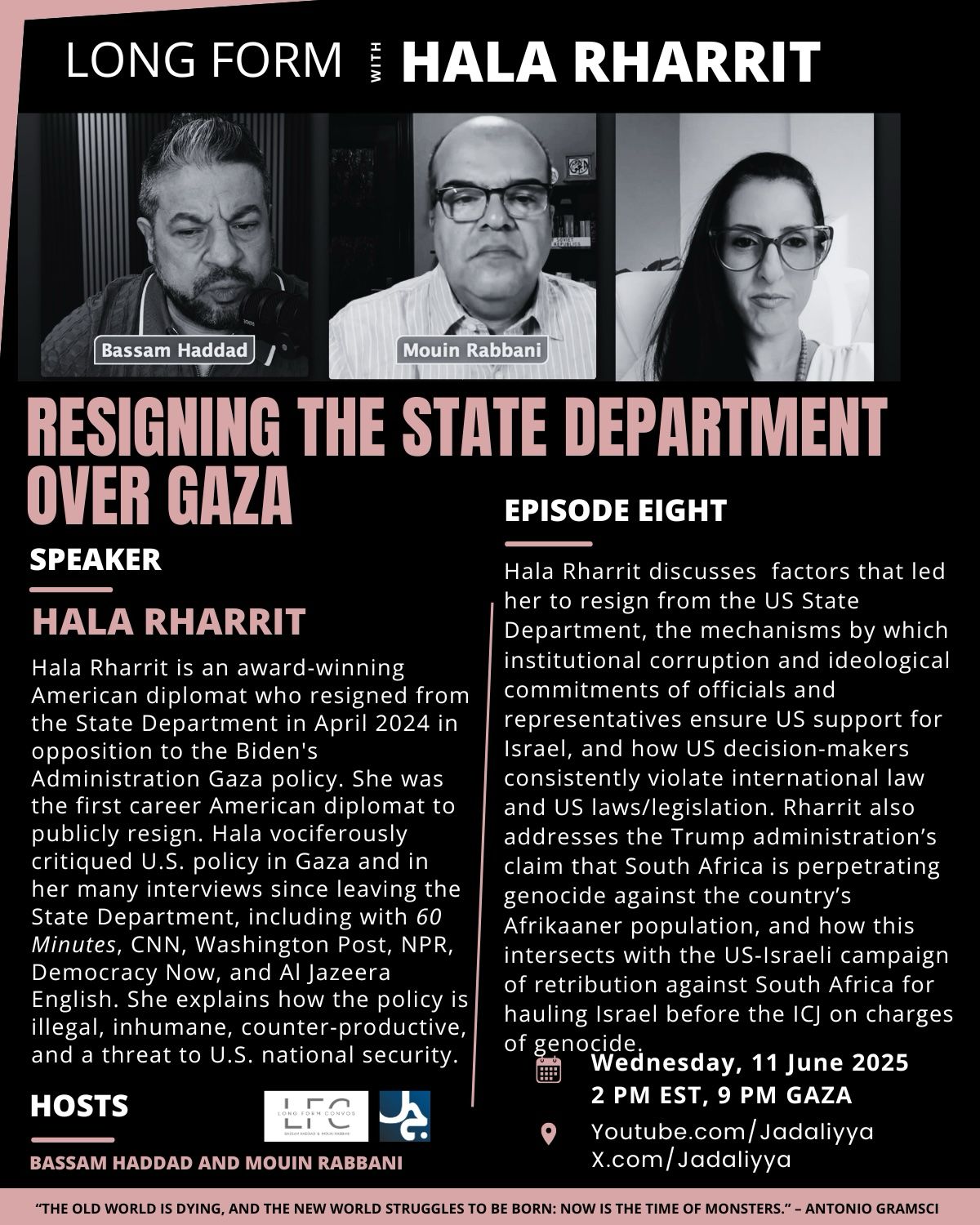Long Form Podcast: Episode 8-
Resigning the State Department Over Gaza
Featuring:
Hala Rharrit
Hosts:
Bassam Haddad
Mouin Rabbani
Wendesday, 11 June, 2025
2:00 PM EST | 9:00 PM Gaza

In this episode of Long Form, Hala Rharrit discusses the factors that led her to resign from the US State Department, the mechanisms by which institutional corruption and ideological commitments of officials and representatives ensure US support for Israel, and how US decision-makers consistently violate international law and US laws/legislation. Rharrit also addresses the Trump administration’s claim that South Africa is perpetrating genocide against the country’s Afrikaaner population, and how this intersects with the US-Israeli campaign of retribution against South Africa for hauling Israel before the ICJ on charges of genocide.
Long Form consists of a series of lengthy discussions and conversations with leading thinkers, scholars, and activists that explores the most pressing issues of our day, sheds light on their context and dynamics, and in so doing seeks to explore the broader theme of challenges to the global order and how these might affect it.

Featuring
Hala Rharrit is an expert in Middle East and North African (MENA) affairs and U.S. relations with the MENA region. She is a political commentator and author. Hala was an award-winning American diplomat who resigned from the State Department in April 2024 in opposition to the Biden's Administration Gaza policy. Hala’s resignation made her the first career American diplomat to publicly resign. She has been one of the most vocal officials critical of the U.S. policy in Gaza and in her many interviews since leaving the State Department, including with 60 Minutes, CNN, Washington Post, NPR, Democracy Now, and Al Jazeera English, she explains how the policy is illegal, inhumane, counter-productive, and a threat to U.S. national security.
Bassam Haddad is Founding Director of the Middle East and Islamic Studies Program and Associate Professor at the Schar School of Policy and Government at George Mason University. He is the author of Business Networks in Syria: The Political Economy of Authoritarian Resilience(Stanford University Press, 2011) and co-editor of A Critical Political Economy of the Middle East(Stanford University Press, 2021). Bassam is Co-Founder/Editor of Jadaliyya Ezine and Executive Director of the Arab Studies Institute. He serves as Founding Editor of the Arab Studies Journal and the Knowledge Production Project. He is co-producer/director of the award-winning documentary film, About Baghdad, and director of the acclaimed series Arabs and Terrorism. Bassam is Executive Producer of StatusPodcast Channel and Director of the Middle East Studies Pedagogy Initiative (MESPI). He received MESA's Jere L. Bacharach Service Award in 2017 for his service to the profession. Currently, Bassam is working on his second Syria book titled Understanding The Syrian Tragedy: Regime, Opposition, Outsiders (forthcoming, Stanford University Press).
Mouin Rabbani is a researcher, analyst, and commentator specialising in Palestinian affairs, the Arab-Israeli conflict, and the contemporary Middle East. He has among other positions previously served as Principal Political Affairs Officer with the Office of the UN Special Envoy for Syria, Head of Middle East with the Martti Ahtisaari Peace Foundation, and Senior Middle East Analyst and Special Advisor on Israel-Palestine with the International Crisis Group. Rabbani is Co-Editor of Jadaliyya, where he also hosts the Connections podcast and edits its Quick Thoughts feature, Managing Editor and Associate Editor of the Journal of Peacebuilding and Development, and a Contributing Editor of Middle East Report. He is Non-Resident Fellow at the Center for Conflict and Humanitarian Studies (CHS) and at Democracy for the Arab World Now (DAWN). A graduate of Tufts University and Georgetown University’s Center for Contemporary Arab Studies (CCAS), Rabbani has published, presented and commented widely on Middle East issues, including for most major print, television and digital media.
Gaza in Context Collaborative Project
Co-Organizers: Arab Studies Institute, Georgetown University’s Center for Contemporary Arab Studies, George Mason University’s Middle East and Islamic Studies Program, Rutgers Center for Middle Eastern Studies, Birzeit University Museum, Harvard’s Center for Middle Eastern Studies, Brown University’s Center for Middle East Studies, University of Chicago’s Center for Contemporary Theory, Brown University’s New Directions in Palestinian Studies, Georgetown University’s Center for Muslim-Christian Understanding, Simon Fraser University’s Centre for Comparative Muslim Studies, Georgetown University-Qatar, American University of Cairo’s Alternative Policy Studies, Middle East Studies Association’s Global Academy, University of Chicago’s Center for Middle Eastern Studies, CUNY’s Middle East and Middle Eastern American Center, University of Illinois Chicago’s Arab american cultural Center, George Mason University’s AbuSulayman’s Center for Global Islamic Studies, University of Illinois Chicago’s Critical Middle East Studies Working Group, George Washington University’s Institute for Middle East Studies, Columbia University’s Center for Palestine Studies, New York University’s Hagop Kevorkian Center for Near Eastern Studies
“The old world is dying, and the new world struggles to be born: now is the time of monsters.” – Antonio Gramsci


\\ LONG FORM CONVERSATIONS //
There can be little doubt we are living in a time of monsters. But is the global order that emerged after the horrors of the Second World War dying in a paroxysm of conflict and violence that are tearing its foundations apart? Or are as we experiencing yet another period of upheaval that will be absorbed and leave the world as we know it fundamentally intact?
Long Form consists of a series of lengthy discussions and conversations with leading thinkers, scholars, and activists that explores the most pressing issues of our day, sheds light on their context and dynamics, and in so doing seeks to explore the broader theme of challenges to the global order and how these might affect it.